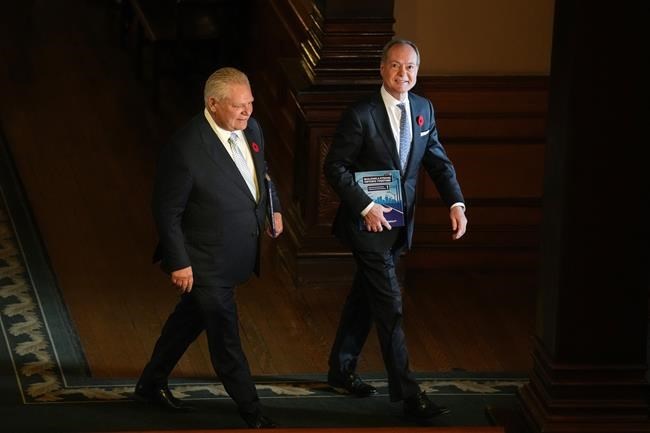TORONTO — Ontario is proposing to launch its own infrastructure bank – with an initial $3 billion in public funding – in order to help foot the bill for long-term care homes and transportation projects, as slowing economic growth has the province sinking deeper into the red.
The Ontario Infrastructure Bank, announced Thursday in the province's fall economic statement, would be an arm's-length agency enabling pension plans and other institutional investors to help fund what the province says is an infrastructure deficit.
The bank would reduce risk associated with complex, long-term projects and provide more flexible financing terms for investors, the government said. It would also reduce the amount of borrowing required by the government for those projects, therefore reducing spending on servicing debt.
"Following in the steps of many other jurisdictions around the world with similar entities, the bank will attract trusted institutional investors to help finance essential infrastructure that would not otherwise get built," Finance Minister Peter Bethlenfalvy said Thursday.
"Canada is renowned for one of the strongest pension systems in the world, including the Maple Eight, the largest funds in Canada and some of the most influential investors in the world. We’ve heard from these funds that they are looking for more opportunities to invest workers’ savings in Canada."
The Progressive Conservative government plans to spend $185 billion in the next 10 years on building infrastructure such as roads, transit and hospitals. The infrastructure bank will initially focus on long-term care homes, energy infrastructure, affordable housing, transportation and community infrastructure, the government said.
Liberal finance critic Stephanie Bowman predicted that the bank would lead to more for-profit businesses in those sectors.
"Trying to attract private money from pension funds, basically, you do that by guaranteeing them a rate of return," she said.
"(The Ontario) teachers pension plan in 2021 had an 11 per cent rate of return. That's the kind of return pension funds will be looking for in order to invest, and in order to invest to get that kind of return, you need to be investing in for-profit businesses."
The Ontario Teachers' Pension Plan said it welcomes opportunities to add to its $25-billion investment portfolio and looks forward to hearing more about projects created by the infrastructure bank.
Bethlenfalvy said investors will want a return, but "profiting" isn't the right way to think about it, he said.
"I think that's really an opportunity," Bethlenfalvy said. "So if you think about energy, for example, ratepayers, there is a revenue stream. Student housing, if you build student housing, there would be a revenue stream. So it's another tool that we can look at that might help, instead of the taxpayer taking all the risk and burden that the bank and its institutional investors will take."
Highways would likely not be projects associated with the infrastructure bank, Bethlenfalvy said, as a revenue stream from those roads would be in the form of tolls, something to which this government is opposed.
The bank is the biggest-ticket item in the province's fall economic statement tabled Thursday by Bethlenfalvy, and the opposition parties criticized a lack of new affordability measures, other than an extension to a 5.7-cent-per-litre gas tax cut.
"(People) don't know what's in front of them, where they're going to end up, where they're going to live, what they're going to eat, and the government says, 'We're going to create a bank and we're going to put a whole bunch of high-paid people in there and they're going to solve all their problems,'" Interim Liberal Leader John Fraser said.
"Get real."
The fiscal update also shows a larger deficit for this fiscal year, and has the province delaying its path to balance by a year.
The spring budget projected a $1.3-billion deficit this year, then getting to balance in 2024-25 with a small surplus, but Thursday's update has Ontario $5.6 billion in the red this year and with a $5.3-billion deficit next year, followed by a small surplus in 2025-26.
The government said the revision is due to slower economic growth leading to smaller revenues, while the province is also adding $2.5 billion to its contingency fund for this year, bringing the total to $5.4 billion, to mitigate near-term economic risks.
"High inflation and the Bank of Canada’s rapid interest rate increases are weighing on Ontario’s outlook for the remainder of this year, and into the next," Bethlenfalvy said.
"Russia’s war on Ukraine, and the recent horrific terrorist attack against Israel, means continued heightened geopolitical uncertainty."
NDP finance critic Catherine Fife called the size of the contingency fund "downright irresponsible."
"(They're) hoarding money instead of investing in key critical services people rely on, like health care and paramedic services, nurses, child care workers, transit and affordable housing," she said.
The net-debt-to-GDP ratio is now forecast to be 38.4 per cent this year, up from the 37.8 per cent projected in the spring budget.
Ontario also announced through the fall economic statement that it is adding $100 million to its Invest Ontario Fund, intended to attract businesses particularly in advanced manufacturing, technology and life sciences, for a total of $500 million.
The Canadian Federation of Independent Business urged the government to ensure small business compensation when all of the upcoming large infrastructure projects affect them.
"While everyone loves a finished project, the construction process can often be so disruptive that small businesses are forced to close before they can benefit," the organization wrote in a statement.
This report by The Canadian Press was first published Nov. 2, 2023.
Allison Jones and Liam Casey, The Canadian Press



